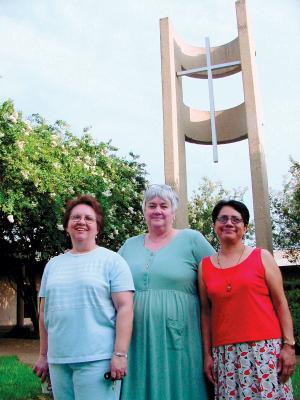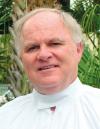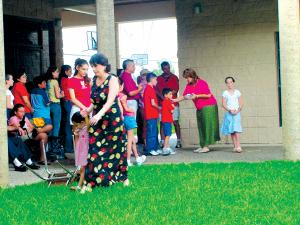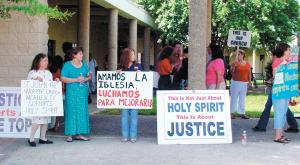Issue Date: August 1, 2003
Firings raise parishioners' hackles -- and questions about church's obligation to follow its own labor teachings By TERESA MALCOLM It takes just one day to upend a parish that was built over 20 years: That was the lesson members of Holy Spirit Catholic Parish said they learned June 18. That was the day the new pastor, Fr. Ruben Delgado, arrived with officials of the Brownsville diocese and a stack of letters. Four were handed out to the employees who were at the Holy Spirit office. They were letters of termination. Witnesses said they believed that the rest of the letters were intended for the entire staff, but that the arrival of media and outraged parishioners cut short the firings. Meanwhile, they said, Delgado slipped into his office and was not seen again. A week later, he resigned, never having said Mass in the parish, or indeed, parishioners said, shown his face after that Wednesday morning. But the “staff restructuring,” as he called it in a written statement released by the diocese, remained in place. The dispute in McAllen reflects a recurring internal conflict in the
Catholic church, which has produced documents strongly arguing the right of
workers to organize ( The story also illustrates the precarious nature of working for the church. Church employees often find themselves vulnerable and it is not uncommon that they are dismissed not on the basis of performance or behavior but simply because of a change in pastors. “It’s unfortunate that many of our religious institutions -- not just Catholic -- often respond poorly when workers choose to organize,” said Kim Bobo, executive director of the Chicago-based National Interfaith Committee for Worker Justice. “Somehow they take it that the workers are opposed to the institution, that they don’t respect the leadership. In reality, workers just want to have a collective voice to affect their future.” The firings here set off an ongoing battle in this heavily Catholic, Hispanic community of the Rio Grande Valley, fueled by the widespread belief that Delgado was merely the hatchet man for Bishop Raymundo Peña, 69, who many think ordered the firings in retaliation for the unionization of the parish staff last year. While the diocese maintains that the firings were Delgado’s decision alone, correspondence from diocesan officials indicated a pattern of moves against parishes with unionized staff -- some workers were fired at another parish and other parishes were threatened with loss of funding.
The United Farm Workers union pursued a legal remedy on behalf of the four fired women -- pastoral associate Anne Cass, coordinator of family ministry/director of religious education Martha Sanchez, sacristan Rosario “Chayo” Vaello, and secretary Edna Cantú. From the first gathering of some 300 persons that Wednesday evening, for the next three weeks parish leaders organized Communion services in the church’s courtyard. Meanwhile, the Valley press has acted as forum for spirited debate, with Peña coming under fierce criticism from local priests and lay people, while others have come to his defense, lobbing charges of disobedience and unorthodoxy at Holy Spirit Parish. The dispute has its roots in the unionization of four parishes in the Brownsville diocese last year (NCR, July 19, 2002). In addition to Holy Spirit, union contracts were signed at St. Joseph the Worker in McAllen, St. Joseph the Worker in San Carlos, and Sacred Heart in Hidalgo.
Fr. Jerry Frank, 61, at that time pastor of Holy Spirit, said he agreed to sign the union contract because of his concern over the diocese’s “insensitive, callous approach to lay employees.” He told NCR that since Peña came to Brownsville in 1995, diocesan employees had lost their jobs or were moved around. “They went through people fast,” he said. “It just seemed to be constant transition and flux, from what I could see. And the quality of the programs deteriorated, from a pastoral perspective.” He said he also noticed a pattern of priests moving to a new parish and dismissing the whole staff. “This didn’t seem fair and just to people who had worked for years and years for the church.” Another point of contention was Peña’s decision to change the lay employees’ pension fund to a 403(b) plan, which some employees felt shortchanged longtime and low-wage workers and provided a one-time check in early 2002 rather than monthly checks upon retirement. When his staff approached him to say they would like to join the United Farmworkers Union, Frank said he signed the contract willingly, “not knowing whether I had the legal right -- I was somewhat doubtful about that -- but as the only protest I could make, the only way I could ensure that my workers would get protected into the future,” he told NCR. He never heard from the bishop that he was not allowed to enter the contract, he said, which he took as tacit acceptance. Loss of funds threatened However, Frank said the three other parishes, less affluent than Holy Spirit, were threatened by the chancery with loss of subsidies. In two letters obtained by NCR, diocesan officials told Fr. Michael Seifert that his parish, San Felipe de Jesús Parish in Brownsville, would not receive funds from a grant from the Catholic Extension Society because the staff there was unionized. “[The] bishop approved the [Parish Needs Committee’s] recommendation that no funds be awarded while the parish is affiliated with the United Farmworkers Union,” wrote the vicar general, Fr. Robert Maher, April 7. “Because it is the expressed desire of the Catholic Extension not to be affiliated with parishes that formed this union, I trust you will understand our inability to help at this time.” A second letter, dated April 28 from diocesan development director Jesse Salinas, repeated the assertion that the Catholic Extension Society did not want to fund parishes associated with the union, citing the organization’s vice president, Richard Ritter. In a telephone interview with NCR, Ritter flatly denied that any such condition had been imposed. “We never told them or anybody that we would not help parishes because employees belong to unions,” he said. “We help parishes that the bishop asks help for and approves the grants for. To say we don’t help unions, that’s crazy. The record of the church is pretty straight on that, I think.” Salinas also told Seifert, “I am certain that if your employees knew of the ineffectiveness of the union contract with regard to their continued employment past your tenure there, they would not have signed. Did you not inform them that the entire unionized staff at Sacred Heart Parish in Hidalgo was let go and along with them, their union contracts? What did the union do for those employees?” Diocesan spokeswoman Brenda Riojas acknowledged the letters but said as soon as the bishop learned of it, the order was rescinded. “The parishes will be granted assistance from the diocese as well as from the Extension Society,” she told NCR. Early in 2003, Frank learned that he was to be transferred. In February, Peña came to Holy Spirit for a pastoral evaluation. “He talked to all the committees, all the staff, everybody,” Frank said. “And there’s no way that anybody that did such an evaluation could not come to the conclusion that this was an extraordinarily well-established, effective, spiritually-based, strong, vibrant, involved parish.” Parish that never sleeps
A booklet for the parish lists 101 ministries, including ones that reach beyond the diocese to support for an orphanage for girls in Reynosa, Mexico, and a sister parish relationship with a church in Guajoyo, El Salvador. Frank and Holy Spirit parishioners have been at the forefront of political activities as well through the community organization Valley Interfaith. “I call us the parish that never sleeps,” said parish council chair Dora Saavedra. “Our staff puts in their 40 hours, but then they put in a lot of volunteer hours also. We’re known for social justice issues. We have gotten a lot of things done legislatively, adopted families at Christmas, helping out with whatever needs to be done.” Numerous parishioners recalled how following the evaluation, Peña praised Holy Spirit during a homily at the church, calling it a “true Vatican II parish.” He told them that he wanted Frank to replicate elsewhere what he had done at Holy Spirit. Frank balked at the bishop singling him out. “So I stood up after the homily -- I would have felt ashamed not to, or very self-centered -- and said, ‘Bishop, I’ve got to tell you that when I came to Holy Spirit 10 years ago, I came to a Vatican II parish. All I’ve been doing for the last 10 years is tagging along.’ The people then gave a big ovation to our entire staff -- the bishop heard that.” Frank said Peña assured him that he had no desire to remove the staff and undo the parish programs, but added that it would be the decision of the next pastor. When Delgado was appointed to Holy Spirit, Frank said, the two priests had a two-and-a-half hour conversation shortly before the transition. “I had no inkling that he was about to fire the entire staff,” Frank said. “I told him why I signed the contract. I told him my fears of the bishop’s possible vendetta against the staff for entering into a union contract. I told him it was a great staff and they’d done a wonderful job.” But Delgado declined to meet with the staff. On the morning of June18, Cantú was the first to arrive. The secretary had been through this before: She lost her unionized job in September 2002 as a secretary/bookkeeper at Sacred Heart Parish, where she is a parishioner, after a new priest came in July. When Delgado walked in that day, followed by “all his committee,” Cantú said, “as soon as I saw them I knew what was going to happen.” When Cass arrived at the rectory on June 18, one of the diocesan employees came to her office to ask where the rest of the staff was. Most were on vacation, Cass replied. The woman handed her an envelope from a stack she held. The letter inside said her “services to Holy Spirit Church are no longer required.” Cass had worked for Holy Spirit for 22 years, including five and a half as pastoral administrator when the parish was without a priest. “This woman comes in and asks me who I am, and I tell her,” Vaello said. “She smiles and says, ‘I have something for you!’ like it was this wonderful surprise. I knew what it was immediately.” Vaello read her letter of termination, and called her husband and told him to call the local media. “I was pretty calm,” she said. “I think I was in shock.” Cass called Rebecca Flores, their union representative, who called the press. Soon volunteers who were present started calling parishioners, who started “coming in droves, just irate,” Cass said. Once the news media arrived, she said, diocesan staff quit giving out envelopes. Delgado: ‘I’m sorry’ Frank received the call from Cass who told him about the firings. He asked to be transferred to Delgado. “I asked him about three times: ‘How could you let the bishop use you like this?’ Then I asked him, ‘How can you lift up your face and look people in the eye on Sunday, knowing all the destruction of people’s lives and careers that you’ve brought in this parish?’ Well, he never did show up for Mass.” Frank said that all Delgado replied was “ ‘I’m sorry.’ ” Late afternoon on June 18, attorneys filed a temporary restraining order calling for the women to keep their jobs on the grounds that they were let go without due process. The women reported to work, but were soon told that they were on paid administrative leave, and had to vacate the premises.
Meanwhile, Holy Spirit parishioners had rallied. More than 300 people assembled for a hastily called meeting and protest that first Wednesday night. Members of various committees coalesced into one Parish Leadership Committee to respond to the crisis. “We united in an amazing way,” said Dora Saavedra, parish council chair. The leadership committee, together with the parish’s two permanent deacons, took the unusual step of organizing a separate Communion service, to be held in the church courtyard, concurrent with regular Mass times. Several anonymous priests provided consecrated bread, Saavedra said. As people arrived, they were told that a visiting priest would be saying Mass, but were given the option of attending an outside service in support of the four employees. McAllen’s newspaper, The Monitor, reported that the numbers outside “dwarfed” the few dozen in attendance at each Mass the first Sunday, June 22. The Mass collection, usually totaling about $13,000, dropped down to just short of $3,500. The collection taken up outside to go toward the women’s legal fees came to $7,000. That Sunday a letter from the bishop to Holy Spirit parishioners was inserted in the bulletin. “I am deeply hurt by the dishonesty in the statements that were made about me and about your new pastor,” he wrote. He said that he had given no instructions to Delgado. The hiring of staff fell under a priest’s ordinary jurisdiction in canon law, and as such he would not countermand Delgado’s actions, Peña said. He wrote that the downsizing was “made in the spirit of the Second Vatican Council ... to motivate and offer all the parishioners the opportunity to share in the mission of the church.” Separate services were held the two following Sundays. The protesters were at pains to explain that they did not want to cause division in the parish over the choice to go inside to Mass or stay outside and attend the Communion service. “We’re trying to do this as respectfully and as lovingly as we can,” parishioner Roland Quintanilla said at the end of the outdoor Spanish service June 29. “Everybody is given an option to protest in whichever way you can. Ask God, ‘What do you want me to do?’ because that’s the bottom line.” One parishioner who chose to go inside, Marisa P. Scott, told NCR, “I believe what the women were working for was a united church and honestly it hurts me to see us divided.” She said she felt “shock ... like someone had told me someone very close to me had died” when she heard about the firings, but “if there’s a priest, I’ll go to Mass inside.” Scott was also filling in as a cantor in the choir’s absence. “In my heart I feel it’s counterproductive,” she said of the outside services.” Workers reinstated A hearing had been scheduled for July 8, and the bishop, Delgado and several other priests had been called to testify, according to James Harrington, director of the Austin-based Texas Civil Rights Project, which is representing Cass and Cantú. The hearing was postponed when the diocese agreed to mediation. Riojas said that in the wake of the events at Holy Spirit, the Brownsville diocese will be examining the process of what happens when a priest goes into a new parish and deals with existing staff, a study that may result in specific guidelines and policies. Meanwhile, the four women returned to work July 7. Cass said it was “stressful,” especially with the two new employees of Delgado’s transitional team. “We don’t know what their responsibilities are, we don’t know what ours are,” she said. “Our primary focus still is to make sure the ministries, the way people are accustomed to them happening, continue,” Cass said. Following the announcement, the parish leadership team decided to go back into the church for Mass, as part of “a good faith effort at mediation,” Saavedra said. Teresa Malcolm is NCR news editor. Her e-mail address is tmalcolm@natcath.org
National Catholic Reporter, August 1, 2003 |




